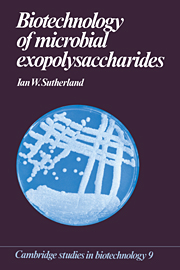Book contents
- Frontmatter
- Contents
- Preface
- 1 Introduction and definition
- 2 Polysaccharide analysis and structural determination
- 3 Exopolysaccharide structure
- 4 Enzymes degrading exopolysaccharides
- 5 Biosynthesis
- 6 Physiology and industrial production
- 7 Genetics, control and regulation of exopolysaccharide synthesis
- 8 Physical properties of exopolysaccharides
- 9 Food usage of exopolysaccharides
- 10 Industrial uses of microbial polysaccharides
- 11 Medical applications of exopolysaccharides
- 12 The future for microbial exopolysaccharides
- References
- Index
Preface
Published online by Cambridge University Press: 09 September 2009
- Frontmatter
- Contents
- Preface
- 1 Introduction and definition
- 2 Polysaccharide analysis and structural determination
- 3 Exopolysaccharide structure
- 4 Enzymes degrading exopolysaccharides
- 5 Biosynthesis
- 6 Physiology and industrial production
- 7 Genetics, control and regulation of exopolysaccharide synthesis
- 8 Physical properties of exopolysaccharides
- 9 Food usage of exopolysaccharides
- 10 Industrial uses of microbial polysaccharides
- 11 Medical applications of exopolysaccharides
- 12 The future for microbial exopolysaccharides
- References
- Index
Summary
Industrial interest in microbial polysaccharides has been stimulated by their unique properties and the opportunity to provide a guaranteed supply of material of constant quality and stable price. One must set against such positive aspects the relatively high costs of the product, of process development, and of downstream processing, especially if the intention is to provide material with approval for food usage.
The aim of this book is to present information relating to microbial exopolysaccharides which have actual or potential industrial or medical importance, rather than to provide comprehensive coverage of the whole field. It indicates the mechanisms by which these polymers are synthesised, as well as techniques used in their chemical and physical characterisation.
There has been a marked upsurge of interest in microbial exopolysaccharides in recent years, from biologists and non-biologists alike. In particular, recent studies on the physicochemical properties of polysaccharide solutions are providing a new insight into the physical structures of these polymers and furnishing the industrialist with a clearer indication of their useful properties. The increased interest in microbial polysaccharides mirrors a growth in the use of water-soluble polymers generally, and also an appreciation of the environmental advantages to be gained from use of water-soluble rather than solvent-based systems.
As many students now receive little instruction in the chemistry of carbohydrates and related molecules, readers may need to refer to a suitable text on that subject. It should, however, be remembered that in many respects the physical properties of polysaccharides are frequently not greatly dissimilar from those of DNA and RNA.
- Type
- Chapter
- Information
- Biotechnology of Microbial Exopolysaccharides , pp. vii - viiiPublisher: Cambridge University PressPrint publication year: 1990

